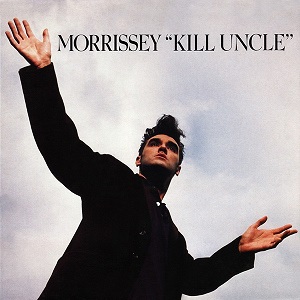Two of the better tracks, both singles, appear near the top of the album. “Our Frank” has welcome guitars and complementary piano, while the sneaky but catchy “Sing Your Life” has a background chorus of multiple Morrisseys and strings even. In between, however, is the mournful “Asian Rut”, which decries racial violence over a string bass, violin, and organ backing. “Mute Witness” is driven by a canned piano right out of the Go-Go’s we can assume comes from co-writer Clive Langer, so it’s surprising when he starts to croon. The silly pop continues on “King Leer”, its title only the first of its wincing puns. (Yet there are those who say the only good puns are bad ones, so it’s up to the listener to decide if the song succeeds.)
Also co-written with Clive Langer, “Found Found Found” celebrates a promising new relationship over an ominous heavy guitar arrangement, which contrasts with “Driving Your Girlfriend Home”, a cinematic little track that recalls some of the more moving Smiths moments. “The Harsh Truth Of The Camera Eye” is a trying song, partially because the whiny (even for him) lyrics about the pitfalls of public scrutiny, partially because of the length, and mostly because of the camera-clicking sound effects and zoo noises. A more familiar, and welcome sound and lament returns for “(I’m) The End Of The Family Line”, a matter-of-fact statement of the consequences of being so unlovable. It’s even got a trick ending. But the true farewell is “There’s A Place In Hell For Me And My Friends”, sung quietly over a mournful piano, with some military snares near the end. (In America, where they couldn’t leave things alone, a fine B-side called “Tony The Pony” has the right sound but completely upsets the mood.)
Critics and the public alike were down on Kill Uncle upon release, but it’s hardly terrible. True to form, the remastered version you can pick up today not only has different cover art and a shuffled track order, but two negligible B-sides are inserted between the original short album sides. More strikingly, “There’s A Place In Hell” no longer ends the album, and has been replaced by a rock version. Oh, and no “Tony The Pony” either.
Morrissey Kill Uncle (1991)—3
2013 Expanded Version: “same” as 1991, plus 3 extra tracks (and minus 2)

No comments:
Post a Comment